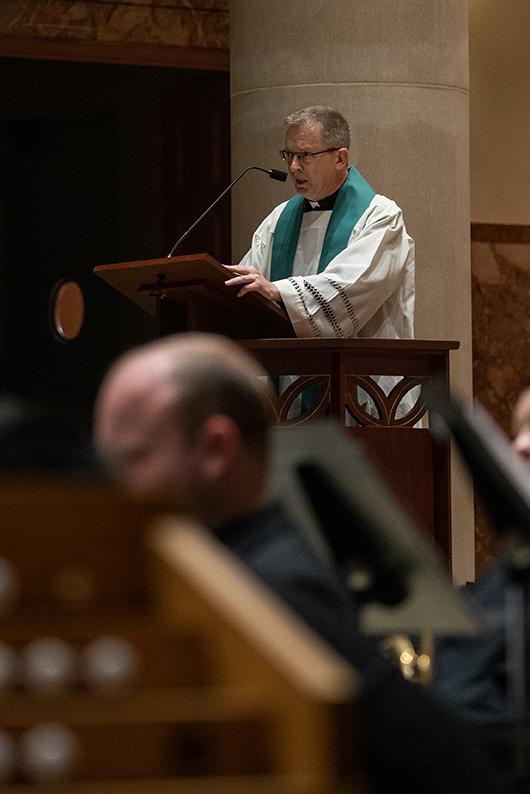Canon Law at 40: Why a Code of Canon Law

The story below was originally published in The Athenaeum, MTSM’s bi-annual magazine. The Athenaeum is published twice a year for alumni, patrons and friends of Mount St. Mary’s Seminary & School of Theology. To be added to the mailing list, contact: Heidi Walsh at 513.233.6159 or hwalsh@athenaeum.edu.
This is the first of three articles featured in the Fall 2023 edition of The Athenaeum magazine reflecting on the 40th anniversary of the Code of Canon Law. Rev. Andrew J. Moss, J.C.L., is an Instructor of Canon Law at MTSM and received his licentiate in Canon Law from Saint Paul University in Ottawa, Canada.
On January 25, 1959 Pope John XXIII announced his intention to convoke an ecumenical Council. This was not, however, the only event of significance for the universal Church that the Holy Father announced; he also stated that there was to be a revision of the Code of Canon Law that had been promulgated in 1917. This anticipated new Code was finally promulgated some 24 years later in 1983, and this year marks the 40th anniversary of its promulgation. Every anniversary is an opportunity for reflection, and this significant anniversary is an occasion to ask a fundamental question — why does the Church need a Code of Canon Law?
Why a Code of Canon Law?
To answer this question we must first ask the question “what is the Church?” The Second Vatican Council gave us an enriched vocabulary in speaking of the Church. The Council’s Dogmatic Constitution on the Church Lumen gentium describes the Church variously as “the People of God,” “the Mystical Body of Christ” and “a communion of life, charity and truth.” Following the Council theologians were enthusiastic to explore the meaning and implications
of these models of the Church.
Another model of the Church used in Lumen gentium — though less taken up by theologians — is that of the Church as a “society.” In the Constitution we read that the Church is “constituted and organized in the world as a society.” This way of speaking of the Church is key to understanding why she has need of a Code of Canon Law. The Church is not only endowed with invisible realities but is also a visible society, and every society has need of its own body of law for the sake of the good ordering of that society. Therefore the Catholic Church does not simply rely on the laws of civil society; rather, she has her own laws, her own authorities, her own courts and her own judges.
Nevertheless, the Church is not to be imagined as merely analogous to civil society, for in the society of the Church Christ the Redeemer is active, and makes the baptized sharers in his work of Redemption. The Church is therefore a society with a specific mission – the salvation of souls. The last canon of the Code states that “the salvation of souls…must always be the supreme law in the Church.”
Thus we have an answer to the question “why does the Church need a Code of Canon Law?” The Church needs its Code is because the Church is a society with a supernatural mission. The purpose of the Code is to regulate this society, so that she can effectively carry out the mission entrusted to her by Christ.
The Code and the Council
Pope St. John Paul II described the 1983 Code of Canon Law as the “last document” of the Second Vatican Council. This profound statement helps us to understand both the Code and the Council. The Code oftentimes directly quotes the documents of the Council in the canons, or summarizes the juridical content therein. This tells us that the Second Vatican Council did not usher in a new understanding of the Church in which the law is de-emphasized. On the contrary, the words of the Conciliar documents themselves form the basis of the law now operative in the Church. Therefore in the post-Conciliar Church the law continues to play a key role in her life and mission. Indeed, the Code assists us in arriving at a proper interpretation of the Council. One cannot appeal to a “spirit of Vatican II” in which the actual words of the Conciliar documents cease to have relevance, since these same words are now the foundation of the Church’s binding juridical norms.
The 1983 Code is therefore intimately linked to the Second Vatican Council. As the “last document” of the Council the Code serves as a vital tool in realizing the renewal of Christian life that was foreseen by the Council fathers.
The Code in the future
The Church will always have need of its Code of Canon Law because the Church will always have its mission from Christ, which is the salvation of souls. The Code serves the essential task of regulating the society that is the Church, so that she might more effectively carry out this mission. All of the baptized have a share in the mission of the Church, and so the Code is for every member of the faithful. As we reflect on the 40th anniversary of the promulgation of the Code of Canon Law, we can hope that this “last document” of the Council might become better known, so that the Church’s law might be understood not as extraneous to her mission, but as an essential part of it.